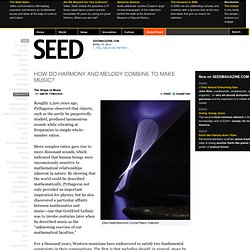

Latest Files - Nightly. Everything popular is wrong: Making it in electronic music, despite democratization. Stefan Goldmann on why Web 2.0 can work for you but won’t for most, where all the money went and how working against the market consensus can be a winning strategy.

Electronic music. What we believed for a long time was that anyone with a bit of talent had a chance at a career of about ten years before eventually retiring from the circuit. Of course there are exceptions for whom this does not seem to apply. Francois Kevorkian has probably had the longest career here (unless we count Kraftwerk as part of our little world); and it’s hard to imagine techno or house without Richie Hawtin, Jeff Mills or Laurent Garnier. That’s the good news: it does not necessarily have to meet a predetermined end. Little White Earbuds - Nightly.
In “Everything Popular Is Wrong,” Stefan Goldmann claimed that the more artists deviate from the known and established, the better their chances are for success.

But why should this be so? Now he offers a detailed examination of the psychosocial framework that underlies what we listen to, looking into the factors that decide what is culturally relevant and what is not — with surprising results: exploring the unknown is not only more fun, but also more rewarding. You can read Part 1 here. Life cycle: crystallizing fields and the avant-garde For an obscure speech, held in 1961 in the German city of Lübeck, anthropologist Arnold Gehlen designed one of the most accurate descriptions of how culture works in the big picture.
He called the concept “crystallization”[1]: any new, emerging field of culture grows to the point where its boundaries, basic rules and antitheses are found. Extended cycles: museum categories Categories emerge, grow and eventually fade away. Case study: Minus vs. Quality Is Overrated: The Mechanics of Excellence In Music. Dangerous Minds. Plexo : Music Essence. A music discovery mashboard you can use to explore social music sites, news, photos, videos, widgets and conversations.

Some of the things you can do here Start your adventures in the digital music landscape using the latest Music 2.0 apps. Surf the social music scene, discover new music and people with similar interests. Share and rate your favorite free music resources via the interactive widget lists. Matrix Map - A Quick Overview Towards the top of the lens you'll find music news and buzz tracking tools. Further down you'll see the Plexo widgets for sharing your favorite music sites. You can share the music lists on your own pages using the widget codes.
Audio tool. History Of House Music ~ 1. The Analog Session - N5 From Outer Space. Music evolution. What was the role of music in the evolutionary history of human beings?

And is it possible at all, you might wonder, to study this empirically, given the fact that neither music nor musicality fossilises? * So, better forget about it? One potential strategy to address this question is to focus on the cognitive traits that could have contributed to the origins of music and musicality (cf. Honing & Ploeger, 2012) and see in how far we share these with other animals. While there has been quite some critique on this idea – i.e. the apparent impossibility of studying the evolution of complex cognitive processes such as intelligence (Lewontin, 1998; Bolhuis & Wynne, 2009)–, a bottom-up approach, in which one looks for the basic mechanisms that combine into a complex cognitive trait – in our case musicality –, seems an alternative and potentially fruitful way to proceed. Bolhuis, J., & Wynne, C. (2009). Honing, H., & Ploeger, A. (2012).
Lewontin, R.C. (1998). De Waal, F., & Ferrari, P. (2010).
Nocow's sounds. Otomata. 16 Jul 2011 Click on the grid below to add cells, click on cells to change their direction, and press play to listen to your music.

Update: Click here to get Otomata for your iPhone / iPod / iPad! Official facebook page: David Vorhaus Analogue Electronic Music 1979. "III. Allegro, Sempre ben marcato" - Nonesuch Radio : Nonesuch Mix. Interview with Trent Reznor on business models in the music industry. Download Software and Manuals. The Shape of Music. Zaha Hadid/Swarovski Crystal Palace Collection Roughly 2,500 years ago, Pythagoras observed that objects, such as the anvils he purportedly studied, produced harmonious sounds while vibrating at frequencies in simple whole-number ratios.

More complex ratios gave rise to more dissonant sounds, which indicated that human beings were unconsciously sensitive to mathematical relationships inherent in nature. By showing that the world could be described mathematically, Pythagoras not only provided an important inspiration for physics, but he also discovered a particular affinity between mathematics and music—one that Gottfried Leibniz was to invoke centuries later when he described music as the “unknowing exercise of our mathematical faculties.” DON'T ASSUME. Updated: Music Technology and Format Timeline. Thank you for comments and emails! I have updated the timeline with recording equipment, software and music services. Please continue to provide feedback and comments on how to improve the Music Timeline! In the end I will put together a more nice looking layout, free to download. Human evolution: Why music? Best Free Podcasts.